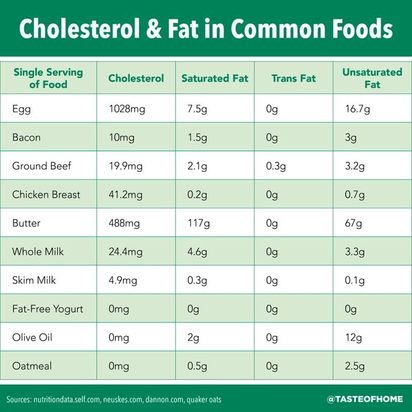What is the Recommended Daily Intake of Cholesterol?
It’s the age-old question that never seems to come with a straight answer. We explain the guidelines on how much cholesterol you can have each day.
What is cholesterol?
Cholesterol is a waxy substance that’s generated by the liver. Your body needs cholesterol to build new cells, produce important vitamins and secrete hormones. Like all animals, your body makes all the cholesterol you need. You take in additional cholesterol by eating animal products like meat, cheese and eggs.
It’s helpful to remember that some cholesterol is a good thing. The problem comes when your body receives too much. Cholesterol travels through the body by circulating in the blood. The more cholesterol circulating in your bloodstream, the more at risk you are for clogged arteries and cardiovascular diseases. Factors like smoking, high blood pressure and diabetes can also increase our risk for heart disease. These foods help unclog arteries.
How do you know your cholesterol level?
The first step to reaching a healthy cholesterol level in your body is to know your numbers. Your doctor can order a lab test to check your cholesterol level and then make recommendations from there.
Now let’s tackle the latest cholesterol recommendations and how to start incorporating a low-cholesterol diet today.
Cholesterol Guidelines
The cholesterol level in your blood is affected by several factors including diet. Limiting the amount of cholesterol, saturated fat and trans fats in your meals will help to achieve a healthy level.
The experts at the National Heart, Lung and Blood Institute recommend limiting dietary cholesterol to fewer than 200 milligrams per day. If you have been diagnosed with high cholesterol, your doctor may recommend a lower goal.
The foods in this chart may be in your fridge or pantry. See where they stand in terms of cholesterol and fat.
 Claire Krieger/Taste of Home
Claire Krieger/Taste of Home
How much saturated and trans fat can you eat?
As far as dietary fats go, aim to limit your saturated fat intake to 10 to 13 grams per day, or 6 percent of your daily calorie intake. It’s best to limit trans fats as much as possible. (Read up on good fat vs. bad fat.)
Cholesterol-Free Foods
Because cholesterol is only found in animal products, plant-based recipes are a great way to add nutrients without upping your cholesterol. Some cholesterol-free foods to start weaving in your daily diet include:
- Fruits
- Vegetables
- Whole grains
- Beans
- Nuts
- Soy products
In addition to being cholesterol-free, many of these healthy foods work to reduce low-density lipoprotein (LDL) cholesterol in the body. LDL is known as the “bad” cholesterol because it is able to stick to the walls of your blood vessels, raising your risk for cardiovascular disease. (The healthy type of cholesterol is high-density lipoprotein, or HDL. Here’s how to increase “good” cholesterol.)
Fiber-rich foods help to move LDL through the blood vessels, rather than letting it stick to the walls and narrow the arteries. Aim to incorporate foods like oatmeal, whole grains, beans, eggplant, apples, grapes, strawberries and oranges. Fatty fish, like salmon, is also helpful in lowering LDL levels because it contains healthy omega-3 fats.
Foods with Cholesterol to Avoid
As we mentioned, cholesterol is found in animal products because it is produced by the body. These foods contain the highest levels of cholesterol:
- Butter, lard and shortening
- Full-fat dairy products
- Red meat
- Processed meats like bologna and hot dogs
Lean proteins like chicken breast and white turkey meat are much lower in cholesterol while still providing that hearty bite you crave.
Are eggs OK to eat if you are watching your cholesterol?
Good news: eggs can be part of a healthy diet. One egg yolk contains about 169 milligrams of cholesterol. Aim to limit your intake to about one full egg per day to keep your cholesterol intake low. As with any food, everyone’s body will react differently to the cholesterol levels in eggs. Talk with your doctor if you’re unsure of how many to eat safely.
More Ways to Lower Cholesterol Levels
In addition to cooking healthy meals, here are other ways to lower your blood cholesterol level:
- Increasing your physical activity
- Quitting smoking
- Maintaining a healthy weight
And luckily, the foods that lower cholesterol naturally are just as delicious as they are healthy!